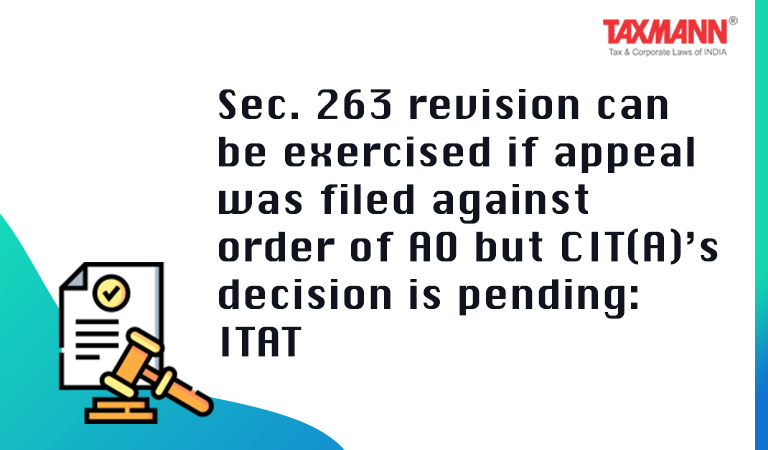Sec. 263 revision can be exercised if appeal was filed against order of AO but CIT(A)’s decision is pending: ITAT
- Blog|News|Income Tax|
- 2 Min Read
- By Taxmann
- |
- Last Updated on 1 December, 2021

Case Details: R Industries v. PCIT - [2021] 132 taxmann.com 302 (Jaipur - Trib.)
Judiciary and Counsel Details
-
- Sandeep Gosain, Judicial Member and Vikram Singh Yadav, Accountant Member
- Rajiv Sogani, CA for the Appellant.
- B.K. Gupta, Pr. CIT-DR for the Respondent.
Facts of the Case
Assessee was engaged in the business of trading groundnut and mustard seeds and oil. The assessee’s case was reopened, and reassessment was completed with some additions. Later, the assessee’s case was taken up for revisionary proceedings under section 263.
PCIT held that the order passed by the AO was ‘erroneous and prejudicial’ to the interests of the revenue. Thus, he directed the AO to decide the matter afresh. The assessee filed against before the Tribunal on the grounds that an appeal against the assessment order of AO was pending before the CIT(A). Thus, PCIT had no jurisdiction under section 263 for revision.
ITAT Held
The Tribunal has held that clause (c) of the Explanation 1 to section 263 clarifies that where any order passed by the AO has merger with the order of CIT(A) or the Appellate Tribunal, the Commissioner can revise that part of the order which has not been considered and decided in such appeal.
From this explanation, it is evident that the power of PCIT under section 263 extends to such matters which had not been considered and decided in such appeal. The use of the word “considered and decided” leaves no room for doubt that if some issue is decided by CIT(A) in an appeal against the assessment order passed by the AO, then that issue cannot be the subject matter of proceedings under section 263.
Explanation 1(c) is based on the Doctrine of Merger, according to which there cannot be more than one decree or an operative order governing the same subject matter at a given point in time.
Where an issue in the assessment order has neither been agitated before the CIT(A) nor considered by him, in such a scenario, that portion of the assessment order will not merge with the CIT(A) order. Therefore, the Commissioner will have the jurisdiction under Section 263 to revise the assessment order with respect to that particular issue.
Disclaimer: The content/information published on the website is only for general information of the user and shall not be construed as legal advice. While the Taxmann has exercised reasonable efforts to ensure the veracity of information/content published, Taxmann shall be under no liability in any manner whatsoever for incorrect information, if any.

Taxmann Publications has a dedicated in-house Research & Editorial Team. This team consists of a team of Chartered Accountants, Company Secretaries, and Lawyers. This team works under the guidance and supervision of editor-in-chief Mr Rakesh Bhargava.
The Research and Editorial Team is responsible for developing reliable and accurate content for the readers. The team follows the six-sigma approach to achieve the benchmark of zero error in its publications and research platforms. The team ensures that the following publication guidelines are thoroughly followed while developing the content:
- The statutory material is obtained only from the authorized and reliable sources
- All the latest developments in the judicial and legislative fields are covered
- Prepare the analytical write-ups on current, controversial, and important issues to help the readers to understand the concept and its implications
- Every content published by Taxmann is complete, accurate and lucid
- All evidence-based statements are supported with proper reference to Section, Circular No., Notification No. or citations
- The golden rules of grammar, style and consistency are thoroughly followed
- Font and size that’s easy to read and remain consistent across all imprint and digital publications are applied



 CA | CS | CMA
CA | CS | CMA
